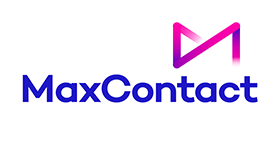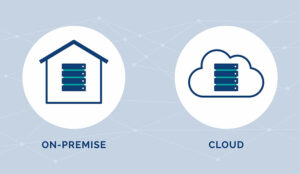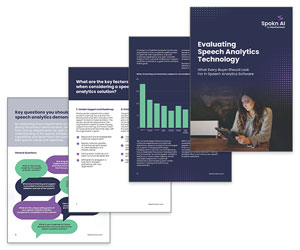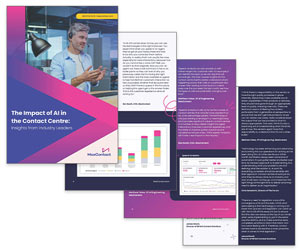For many businesses, delivering exceptional customer service – whether it be face-to-face or over the phone – is no longer a differentiator, it’s a necessity.
But keeping pace with evolving customer expectations can be daunting. Today’s customers expect seamless, omnichannel interactions across various touchpoints, from voice calls and emails to social media and chat platforms.
Thankfully, this is where modern contact centre software comes in, empowering you to step up your customer service experience with ease.
In this guide, we explore contact centre software, what it does, how it can improve contact centre operations, and considerations to make when choosing the best solution for your needs.
What is Call Centre Software?
Call centre software is a suite of tools and technology used to manage and improve inbound and outbound phone calls, or support agents in their communication with customers.
Call centre software has various functionalities, that can include:
- Call routing
- Call recording
- Performance analytics
- Workforce management
- Speech analytics
However, with customers expecting to be able to use multiple channels to communicate, call centres need to offer omnichannel communications, and traditional call centre software is gradually being replaced by contact centre software.
What is the Difference Between Call Centre Software and Contact Centre Software?
The main difference between call centre software and contact centre software is that the former focuses on voice interactions while the latter encompasses a range of communication channels.
Call centre software primarily supports incoming and outgoing phone calls. Meanwhile, contact centre software offers a broader scope of tools to help agents handle everything from calls to emails, instant messages, and social media.
Most modern businesses opt for contact centre software to help them cater to diverse customer preferences, improving the overall user experience across every contact touchpoint.
More and more traditional ‘call centres’ have migrated towards an omnichannel approach by integrating new methods of communication and implementing more flexible contact centre software.
On-Premise vs Cloud Contact Centre Software: Which is Best?
When it comes to contact centre software, there are two main types. On-premise contact centre software is the more traditional model, where all of the technology infrastructure is handled by an in-house data centre.
The more modern, cloud-based alternative relies on third-party cloud hosting to alleviate the need for physical data storage at the contact centre itself.
There are pros and cons to both types of contact centre software, so the type that is right for your business usually depends on your needs and priorities.
However, in recent years, cloud-hosted options have rapidly become the most popular choice thanks to their lower costs, flexibility, and efficiency.
On-Premise Contact Centre Solutions
| Pros | Cons |
|---|---|
| Greater control over software and hardwareAll data stored on-site for enhanced privacy and security
No monthly payments required |
Expensive and time-intensive installationComplex infrastructure and maintenance
Limited scalability |
Cloud Contact Centre Solutions
| Pros | Cons |
|---|---|
| Quick to set upEasy to integrate and maintain
Flexible monthly pay models Easily scalable Accessible remotely for at-home employees Automatic updates |
Reliance on a third-party providerOnly partial control of software infrastructure |
Clearly, there are lots of benefits to choosing or switching to cloud-based contact centre software.
Choose a reliable provider, and you’ll be able to unify all of your communication channels with one flexible solution that allows you to quickly scale up and down according to demand.
You can add seats with just a few clicks, allow for remote working, and even seamlessly share essential data throughout your organisation, with high-tech data collection and analytics. Put simply, cloud contact centre software leaves space for innovation, adaptability, and growth.
Common Features of Contact Centre Software
If you’re scaling up or simply looking to upgrade your contact centre software, you might be wondering about the features and benefits of the products of today.
The majority of modern products are flexible to your needs, but can include the following features:
- Automatic Call Distribution (ACD): This simplifies incoming calls and automatically distributes them according to the availability of your agents.
- Interactive Voice Response (IVR): An automated system that helps to quickly filter incoming calls to the right departments by allowing callers to interact with a pre-recorded or text-to-speech interface to exchange relevant information.
- Omnichannel Communication Channels: Most modern contact centre software supports voice, email, chat and social media communications, offering enhanced visibility over all of your customer’s interactions at once.
- Call Recording & Coaching: Gives team leaders the option to record or listen to conversations live and offer training in real-time, as well as streamlined monitoring and feedback.
- Workforce Management: Innovative contact centre software uses advanced analytics and AI to help you schedule and assign agents according to resources, skills and demand.
- Reporting & Analytics: You can gain valuable insights into the needs and behaviours of your users with customisable analytics dashboards.
- Speech Analytics: AI speech analytics software can analyse speech, language and sentiment to improve quality assurance, prioritise the most important calls, and gain a better understanding of user’s needs and feelings.
- CRM Integration: Contact centre software can now be fully integrated with your wider CRM systems from Salesforce to HubSpot and Zoho. This ensures customer data is aligned across teams and at your fingertips when required.
- Security & Compliance Features: From secure payments handled by IVRs, to robust data protection and compliance, high-quality contact centre software has several built-in features to protect your business and all of its communications.
Why Use Contact Centre Software?
Along with all of the capabilities mentioned above, there are many more benefits to using modern and responsive cloud-hosted call centre software. It can help:
Improve the Customer Experience
Streamlined contact centre software often results in faster resolution times when it comes to customer complaints and enquiries, resulting in positive customer experiences.
It can also help direct incoming calls and messages to the correct department faster, reducing waiting times.
Customers also have the flexibility to reach out in a way that suits them, whether they want to chat via instant messenger, send an email, or resolve their query over the phone.
With the help of tools like AI chatbots and IVR, they can often get the answers or solutions they need without the need for agent intervention.
Meanwhile, omnichannel capabilities allow agents to offer a more personalised experience, with all of the customer’s communication history at their fingertips.
Supercharge Agent Productivity
Call centre solutions have long sped-up processes, with incoming calls automatically routed to the next available agent.
Modern contact centre software also allows you to record calls for quick and reactive agent training, with performance analytics to help you fine-tune ongoing operations.
Agents also have access to a more comprehensive array of customer information and data, helping support clients at scale.
Streamline Operations
Nowadays, contact centre software does more than just support communications. Clever tools and intelligent analytics can monitor and assign agents according to resources and demand.
Automated and self-service systems allow you to reduce labour costs while serving more customers at speed.
Meanwhile, a modern, cloud-based system costs less to install than a traditional on-premise data centre, with flexible monthly payment plans depending on your needs. This boosts the bottom line while streamlining operations.
Facilitate Scalable Growth
Whether you are on a rapid growth trajectory or have an uncertain landscape ahead, modern contact centre software is agile and can adapt to your changing needs.
Resources can be adjusted at the touch of a button according to call volume and demand, without the need for complex or expensive hardware adjustments.
How to Choose the Best Contact Centre Solution for Your Business
When comparing contact centre software solutions and providers, it’s important to consider a few different factors at play:
- Unique Needs of Your Business: Be sure to opt for a solution that solves the challenges you face.
- Budget and Scalability: Consider both up-front and long-term costs, taking into consideration future growth and changing business needs.
- Security and Compliance: Always make sure the provider you are considering offers robust security encryption and certified ISO compliance.
- Integration With Existing Systems: Search for contact or call centre solutions that can be seamlessly integrated with your existing systems for improved workflow and productivity.
- Reputation and Support: Opt for a reputable provider that offers ongoing support to safeguard against potential issues. It’s always a good idea to take time to consider and compare the online reviews and case studies of potential providers.
This blog post has been re-published by kind permission of MaxContact – View the Original Article
For more information about MaxContact - visit the MaxContact Website
Call Centre Helper is not responsible for the content of these guest blog posts. The opinions expressed in this article are those of the author, and do not necessarily reflect those of Call Centre Helper.
Author: MaxContact
Published On: 11th Apr 2024 - Last modified: 6th Dec 2024
Read more about - Guest Blogs, MaxContact






 MaxContact is customer engagement software that goes above and beyond to build smarter customer experiences. Our platform is packed with powerful features, accessible for businesses large and small, and ensures organisations can operate compliantly.
MaxContact is customer engagement software that goes above and beyond to build smarter customer experiences. Our platform is packed with powerful features, accessible for businesses large and small, and ensures organisations can operate compliantly. 































